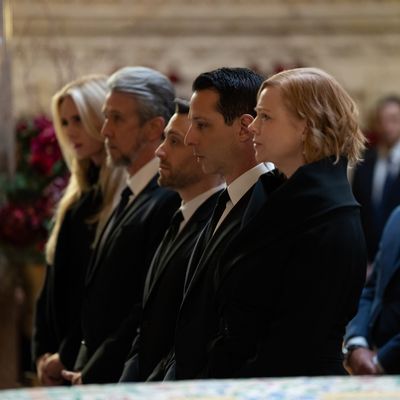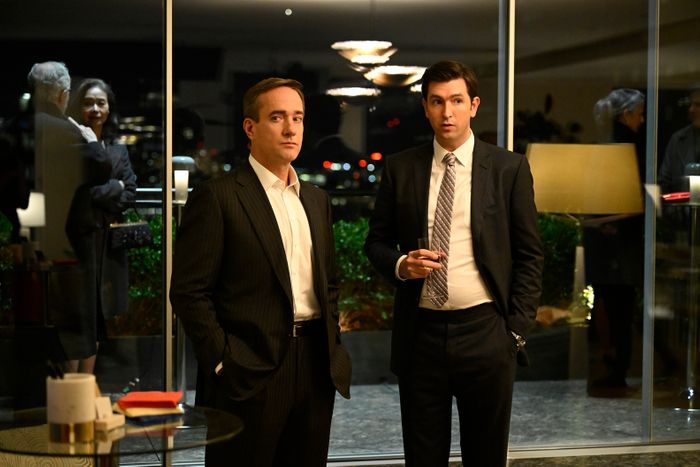
Logan Roy died alone in a tiny airplane bathroom fishing his phone out of a toilet. It was an ignominious end for the titan of industry — as embarrassing as choking to death on a hot wing.
Some fans complained that the towering Roy, the character that the series had revolved around since its beginning, should have been given a more dignified send-off. Others griped that his demise was off-camera.
But his death could not have been more fitting because it hammered home one of the most beautiful parts of Succession, a thing that made it so daring, so different, and so damn enjoyable over its four-season run, which concluded Sunday on Max: It dared to suggest that having mountains of money won’t fill whatever emptiness is inside you, and more than likely, that fortune will make you straight up miserable.
Understand, this is an almost anti-American idea. It’s borderline treasonous. It flies in the face of the many messages beamed from pop culture, whether it be in movies, TV, or social media that say: Money. Is. Everything. It is what we’re told to aspire to. It is how we measure our worth.
The TV landscape alone is filled with near-constant reinforcement. Your cat can’t step on the remote without accidentally switching to a show whose entire premise is about conspicuous consumption, from the real estate porn of Million Dollar Listing, to the Wall Street excess of Billions. And what is the entire Kardashian empire but an ad for a (fictionalized) lifestyle that fans are meant to buy into via overpriced cosmetics?
Succession, too, was about a lifestyle. But the picture was far darker. Every single character in the show — as well as the cast of hangers-on — was filthy, stinking rich. And every single character was an arguably horrible human being with whom you wouldn’t want to spend five minutes sipping a $9 latte.
The series is less aspirational lifestyle than avoidance therapy. The four Roy children might have turned out to be awful people without their billions, of course, but having that wealth allowed them to never address their shortcomings, making them more unhappy, and ultimately less-fulfilled people. That money allowed their sicknesses to grow. It allowed them to live inside a bubble, away from normal people and surrounded by yes-men and -women who never forced them to honestly reckon with themselves.
Kendall seemingly never had anyone to put a pin in his inflated sense of self— despite never, you know, actually accomplishing much. He lived constantly in his father’s shadow, tormented by the massive gap between his own perceived talent and his actual success.
Connor, too, despite arguably being the most normal of the Roys, also seemed to suffer similarly. He, like so many superrich men before him, seemed to equate wealth with intelligence and competence. The miscalculation pushed him to pursue a humiliating crash-and-burn presidential campaign.
The family’s money and power also allowed Roman’s sexual perversities to grow and left Shiv a cold, closed person incapable of receiving love. These are issues that even the triple-mint Manhattan penthouses, the private jets, and the giant yachts can’t cure.
The Roy-adjacent Tom devoted his life to his relentless quest for more, unable to realize that it was all a dead end and none of it was going to make him happy — not the ladder-climbing marriage to Shiv, his endless sucking up to Logan, or his “Disgusting Brothers” antics with Cousin Greg.
And then there was Logan, the personification of the show’s dark theme. Logan spent his life neglecting his family in the pursuit of ever more power and riches — never mind that he already had more than he could ever spend. In the end, he wound up with children who feared him, a pew’s worth of jilted ex-wives and mistresses, and an iPhone wedged in a toilet. He died while jetting off to Europe to close a deal instead of attending his son’s wedding. (Granted, his son was entering a marriage of convenience to a former escort, but still.)
It was a fitting demise. To give him an on-camera death, say, in a three-episode arc where he slowly succumbs to cancer, would have completely missed the point. Death can come for us — any of us — at any second. We cannot choose its time or place any more than we can control a celebrity’s dating life. Death doesn’t care how much is in our bank account or what billion-dollar deal we’re about to clinch.
Lottery winners regularly become depressed, they get divorced, they commit suicide. Money can’t buy you happiness, and Succession was one of the sharpest and wryest reminders of that age-old axiom.
Subscribe to Max to watch all four seasons of Succession.
This advertising content was produced in collaboration between Vox Creative and our sponsor, without involvement from Vox Media editorial staff.


